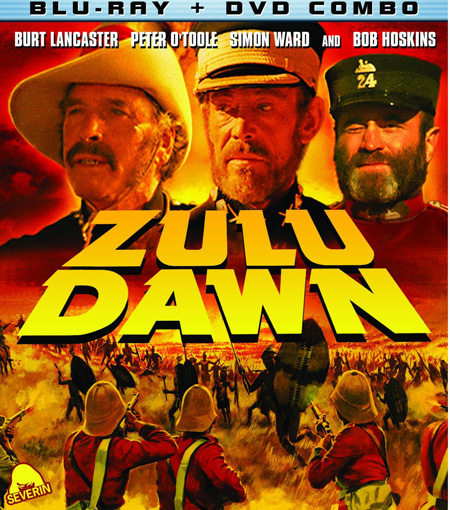
By Lee Pfeiffer
Fifteen years after co-producing and directing the British Victorian-era war classic Zulu, Cy Endfield brought an epic prequel to the story to the screen with Zulu Dawn. Unlike the original film, however, this 1979 release suffered from a bungled and scatter shot North American release that ensured that very few Yanks or Canadians ever had the opportunity to see the film in theaters. Botched release notwithstanding, the movie is in many ways as good as its predecessor, even if the screenplay falls short on presenting the main characters in a fully developed way. The story pertains to the greatest British military defeat of its era as the Victorian penchant for colonialism extended into South Africa. Initially the indigenous Zulu tribes had a cordial relationship with the British, but a foolish change in political strategy saw increasing incursions onto Zulu territory. The Zulu king went to great lengths to avoid confrontation until it became obvious that the local British officials were intent on taking their land by military force. The British expeditionary force led by Lord Chelmsford (Peter O'Toole) is well-armed with the latest weaponry and feels completely confident about a quick victory over the tribesmen, who are largely relegated to using primitive weapons. Like his American contemporary, General Custer, Chelmsford is an egotist with an overblown sense of self-confidence. He makes Custer's mistake of dividing his army into smaller units, spaced far apart. When the Zulu warriors mount a massive, surprise attack in what became known as the Battle of Isandlwana, the British are quickly overwhelmed. Like the original film, Zulu Dawn treats the native tribesmen with full respect and the script is clearly sympathetic to their cause. The British soldiers are depicted as courageous and gallant, but their superiors are generally seen as pompous snobs. A notable exception is the true life character of Col. Dumford (Burt Lancaster), a maverick Irishman who leads a contingent of African troops fighting with the British. Dumford tries to convince Chelmsford that his military strategies are flawed but his pleas fall on deaf ears. By the time Chelmsford and his reinforcements arrive at the battlefield, they find a seemingly endless plain of thousands of dead bodies, as only a handful of British troops managed to escape.
Zulu Dawn is a genuine epic with first rate production values with a sterling cast that includes such prominent actors as Simon Ward, Anna Calder-Marshall, John Mills, Denholm Elliott, Nigel Davenport and Bob Hoskins. The latter half of the film is devoted entirely to the battle sequences and they are stunningly staged and photographed, with Elmer Bernstein providing the stirring score. The movie is very well directed by Douglas Hickox, who is primarily remembered for Theatre of Blood and John Wayne's Brannigan. However, one must acknowledge that on a film of this scale, much of the credit must go to the second unit team as well.
Severin Films, which recently released a terrific special edition of another great '70s British war flick The Wild Geese (click here for review), has presented Zulu Dawn as a special edition Blu-ray/DVD dual package. The quality is outstanding on the Blu-ray but I'm always even more impressed by Severin's bonus extras. In this case, they include a fascinating history of the Zulu conflicts with scholar and author Ian Knight, who talks seemingly endlessly about every facet of the battle. The word "endlessly" here is meant as a compliment. Although I consider myself a military history buff, Knight's segment is like attending a master class and I realized how little I actually knew of the events depicted in the film. Knight explains that, although the Zulus won the battle, they suffered tremendous losses in the process and their victory was short-lived, as Lord Chelmsford ultimately sent their king into exile. The Severin crew also flew Knight to the actual battle locations in South Africa and it's truly amazing to see how untouched they remain to this day. (Crudely constructed above--ground grave sites for the soldiers still dot the battlefield.) There are also raw footage outtakes and some deleted scenes including several variations of Bob Hoskin's character's death. Another interesting segment features an extensive interview with historical and military consultant to the film, Midge Carter. Carter was an unemployed Brit with an in-depth knowledge of the film who just phoned the production company and ended up getting hired to ensure accuracy. Carter makes for an engaging interview, telling interesting tales about how he prevented historical inaccuracies from being included in the film. He also trashes director Hickox as a snobby elitist with a less-than-impressive work ethic. He also shares his scrapbook of on-set photos which had been autographed by every member of the cast. Severin interviews are always excellent to watch, thanks to producer David Gregory and Carl Daft's determination to let them go on as long as necessary and not worry about the length of the pieces. I only wish this was the case with some of the documentaries I produced for major studios, where there was always a bizarre determination to trim everything to the bone. Severin also doesn't indulge in gimmicky special effects or camera work. They simply turn on the camera and let the subject talk. Not fancy in terms of technique, but a wonderful throwback to how interviews used to be presented. Finally, there is an original theatrical trailer included in the set.
Chances are you haven't seen Zulu Dawn. You're in for a real treat with this superb presentation of an excellent film.
CLICK HERE TO ORDER FROM AMAZON